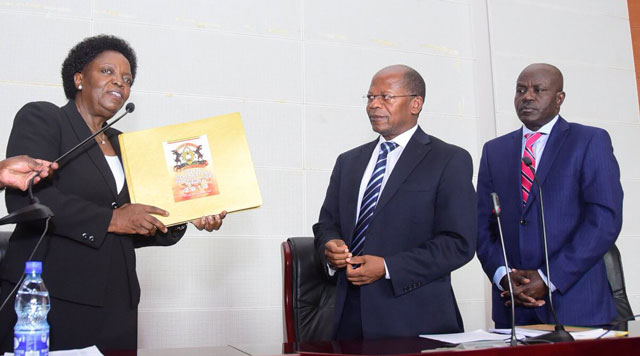
It is a point made by John Chrysostom Muyingo, the minister of state for Higher Education.
“Schools and teachers must go back to the basics and handle the teaching of science as it ought to be; theoretical and practical aspects of science teaching go hand in hand, and not one after the other.”
According to him, the uptake of science subjects will get better once the problems which affect the transition of students from lower to upper secondary level are identified.
Science textbooks not read
In fact, lack of masterly of the English language appears to be tied to another problem that the Ministry of Education has unearthed – the failure to read textbooks.
Speaking during the release of the 2017 UACE results in February, Benson Kule, the commissioner in charge of Secondary Education said, thanks to a World Bank funded project, the government has given science and mathematics textbooks to secondary schools. Unfortunately, he said, it appears the books are not being read.
“We have moved around the country inspecting the schools and we have discovered that the books that were supplied to the schools are still new with many still in the boxes,” Kule said.
The commissioner said since the Ministry’s school inspectors cannot be everywhere, head teachers have been instructed to ensure that the science text books are used by the students to improve results. Is it not possible the head teachers already know this, but also know that the students lack masterly of the English language and, therefore cannot read the books?
Kule was reacting to concerns about the continued low uptake of science subjects and yet another poor performance in science subjects by the 2017 UACE candidates.
Odongo had earlier noted that, whereas mathematics, chemistry, biology and physics are compulsory subjects at O-Level, the number of students opting for science combinations at A-Level remains low.
UNEB officials say entry figures continue to show that the overwhelming majority of learners are opting for humanity subjects. In 2017, only about 20% of the candidates opted to sit for science subjects.
Odongo said only 22.8% of the candidates who sat for UACE offered mathematics, down from 31.3% in 2016; physics had 13.8%, a slight increase from 12.5% in 2016. Chemistry had 15.2%, a decline from 16.2 and biology, 13.0%, a decline from 16.9%.
When it came to actual performance in the examinations, Odongo said only 1.5% of the candidates scored ‘A’ in mathematics, while those who scored ‘A’ in physics were 1.9%, chemistry (1.7%) and biology (0.1%). Close to 50% of candidates who registered for sciences barely passed or got an ‘E’.
Odongo said even if the 2017 candidates had performed slightly better in biology and chemistry, the general performance in science remains poor.
Lack of laboratories
Even the coveted improvement in practical laboratory experience appears to be affected.
According to members of Parliament’s Standing Committee on Education and Sports who travelled around Uganda to inspect schools, they found “shocking things in some of the schools.”
“We found expired chemicals; schools didn’t have laboratories and where we found laboratories, we found that biology and physics practical lessons were being done in the same laboratory,” said Joseph Gonzaga Ssewungu, the MP for Kalungu West (DP) who is on the committee.
Ssewungu says the MPs found some schools did not have science teachers. He said there are schools in the countryside that do not have science teachers because the government has refused to recruit new science teachers.
“We have said recruit science teachers; the government has refused; pay those ones who are in the system, they have refused, provide laboratory equipment and utilities, they are not there,” he said, “If a student takes four years to touch litmus paper or see a specimen, how do you expect them to perform?”
Dr. Mary Goretti Nakabugo, the head of Uwezo— a Twaweza East Africa programme that tracks learning and numeracy outcomes around the region also agrees with MP Ssewungu. She told The Independent on March 05 that unless the government makes ample investments in science teachers and science practical facilities, the compulsory science policy needs to be rethought.
 The Independent Uganda: You get the Truth we Pay the Price
The Independent Uganda: You get the Truth we Pay the Price




TEACHERS
SHOULD BE MOVITED UP AND
STUDENTS SHOULD CONSULT WHERE THERE IS NEED